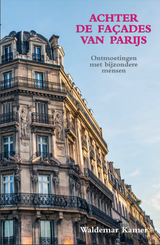

Books
Behind the faûÏades of Paris - encounters with remarkable people

In twenty years, Waldemar Kamer has had much time to explore the back streets of the City of Light. He arrived with his suitcase at the Gare du Nord when he was eighteen, he only knew one person in Paris ã who threw him out the very next morning. He started as an au pair and was granted a place to sleep in the garage, under a Paris roof nonetheless.
This is where the conquest of a metropolis full of encounters with miscellaneous people began. The series of portraits of this book begins with that of a rich and well-born widow who was renting out a garret. The plush building had a view over the gardens of the Prime Minister's residence, the HûÇtel Matignon, but he was not allowed through the main lobby. He had to use the service entrance, which led to a three hundred meter long underground corridor. It was under these roofs and in these corridors that he met the caretaker, servants and many other people who had come to Paris in search of fame and fortune: a cook, a fashion designer, a taxi-driver, a gigolo ã all were about twenty years old.
Each chapter presents a different person or a group: Sorbonne or drama students, the members of a theatre company, two tramps in the metro, three market sellers, the centenarian neighbour, a Russian opera singer born 'before the Revolution', a mysterious lady with a fur cloak, a flamboyant count, a prince, many artists and bohemians. In the meantime, the author made his way through Paris; he left the garret and entered as a journalist and stage director for the opera through the main entrance of the very same houses where he used to only be allowed access through the service entrance. That did not stop him from looking behind the faûÏade. He discovered the mediocrity of the ministers he interviewed and the weariness of the princes who threw grand receptions.ô
Even the stars were lonely: Arletty was old and blind and he told her poems over the phone; Marlene Dietrich wrote him one of her last letters, and he would read a poem by Goethe for Rudolf Nureyev ã at his funeral.

View the book
Published in 2019 by Elmar (The Netherlands)
A family chronicle

An illustrated list of people - Table of contents
Like many refugee children and grand children, W.K. grew up with the stories of a far away world, East of the 'Iron curtain', that his family had to leave under tragic circumstances in 1945. His grandmother continued to live in that world and her apartment, filled with black and white pictures, resembled a mausoleum. One day, she opened the cupboard where she kept 'her treasures'. From the moment W.K. held them between his hands, his grandmother's father's diaries, her husband's letters and the memories of their eldest son, these documents never left him. Every year, new ones mysteriously appear to him. Since almost thirty years he has written to save these documents (illegible for people of his generation) and to restore this lost world, as if he were putting back together a torn up old picture, shred by shred. It is much more than writing, he is doing what his grandmother ãwho died a very long time ago- never was able to do while she was still alive: he is 'fixing' somethingãÎ

In an article W.K. explains
the reasons behind this chronicle:
- Read the article (in English)
- The list of people (in English, with pictures)
- The Table of contents and the prologue
(of volume I, in German)
Volume I (1850-1915) finally finished in 2009 (1.000 pages)
Volume II (Gisela 1911-1937) is to be released in 2011 (1.000 pages)
Volume III (interviews and annexes) is to be released in 2012 (1.000 pages)
A short story

Finally, to end with a bit of literature, this page mainly made of links to long books, here is a short story ã more a reminiscence ã written by W.K. in 1984; one of the first texts he published:
for B.
You were standing there, the lake was shimmering, it was freezing, a few hours before dawn. A cold breeze was blowing over the water and caressing your hair. Everything was glittering; the landscape was covered with diamonds, just as if the stars had come down from the sky to join us in these beautiful momentsãÎ
The world had been like this two days before. Now we were riding through the forest; you on a black horse, a shadow gliding, flying over the landscape; I on a little white Arab, nervously trotting behind you. Calm reigned over the dark long silhouettes of these big old cathedral-like trees and peace was all around us and in us. We hadnãt seen a soul for two hours and were on our way back. Like two proud eagles our horses were bending their necks and their eyes pointed intently towards our goal ã home.
You were galloping in front of me. I still see the wood, but then suddenly nothing; my mind blanks it out. I vaguely recognize your face between the leaves on the ground, lightened by the moon and a black shadow running away. The powerful horse was returning home - alone. As I lifted you from the ground you started screaming. You continued while I was carrying you to the next house, the next light. They were just a kilometer away: light, warmth, hope. But in us were only fear, blood and pain. This contrast was so strong: the peaceful landscape which continued to bathe silently in the cool moonlight, while warm blood was running out of your ear on my face. Darkness was coming over usãÎ
Ambulance, a siren yelling just above our heads, panic in the eyes of the doctor, white hospital-doors - and fear that stabs you like ice peaks. Your heart making little waves on a screen. Little green waves: the ripple of your life. Once a stone had been thrown into a lake and small waves kept on coming to the shore. A storm came. The waves grew huge and threatening, silences grew in between them and then suddenly nothing, ãle videã. The lake was cold, the castle was abandoned, the dream was over. Where were you? Where was I?
I was standing there at the foot of your bed, being aggressed by cold white walls, cold white shirts and cold white hospital facesãÎ And you?
I went to see you often. A smile in your eyes, a little smile on your lips while you were besieged by instruments, bandages and drips. Blood crusts on your blue operation shirt ã signs of life are always beautiful. Even though deformed by this accident, you were never so beautiful. Because you returned to life after our hearts had stopped beating for an instant. Now things will never (exactly) be the same again.
W.K. Brussels, January 1984
